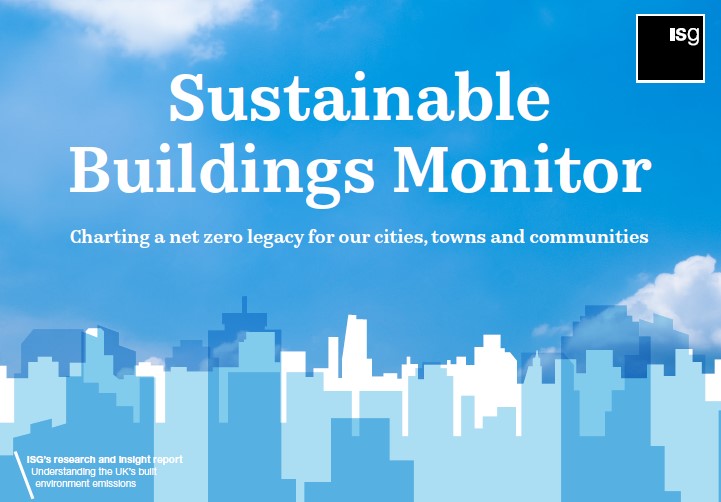Sustainable Buildings Monitor
Contents |
[edit] Introduction
In May 2021, the construction services company ISG published the Sustainable Buildings Monitor. The report examines the range of carbon emissions created by the operation of non-residential buildings in different regions of the UK. The research was conducted by the Centre for Economics and Business Research (CEBR) on behalf of ISG.
[edit] Findings
CEBR used publicly available information to set out regional estimates of the emissions and energy consumption of commercial buildings to assess the scale of the net-zero challenge. The report concluded that all regions have a significant distance to travel to achieve carbon neutrality by 2050.
[edit] Regional highs and lows
Analysis showed that the South West is the least energy intensive while Scotland is the most energy intensive. Scotland’s high levels of consumption were linked to its temperatures and its native industries.
Regions including London and the South-East, with a higher reliance on electricity, would perform marginally better in 2021 due to the changes in electricity carbon emission factors.
[edit] Performance factors
A significant factor in building performance is related to the maintenance regime and optimisation of building services. Data suggested that poorly performing building services account for a significant percentage of energy use and emissions production.
Also, the effect of sector clustering in preferential locations that provide commercial advantage, for example access to transport hubs, a highly skilled local workforce or abundant energy supplies also contributed to regional variances.
[edit] Innovative sectors
The report’s industry analysis highlighted how some of the UK’s most important sectors are embracing innovation. Education and healthcare were recognised for their commitments to moving towards zero carbon goals. Data centres were also acknowledged as innovators in terms of energy usage.
[edit] Standardising data
One of the most significant findings revealed an inherent challenge - the availability, timeliness, quality and inconsistency of data - highlighting the need for a uniform and transparent process for benchmarking and performance measurement. ISG sees standardised data as pivotal in the fight to reduce carbon emissions.
[edit] Related articles on Designing Buildings Wiki
- Building maintenance.
- Building services.
- Building services maintenance contractors’ role in reducing carbon emissions
- Net zero carbon 2050.
- Renewable energy.
- Scotland publishes plans to reach net zero targets with Heat in Buildings Strategy.
[edit] External resources
Featured articles and news
Inspiring the next generation to fulfil an electrified future
Technical Manager at ECA on the importance of engagement between industry and education.
Repairing historic stone and slate roofs
The need for a code of practice and technical advice note.
Environmental compliance; a checklist for 2026
Legislative changes, policy shifts, phased rollouts, and compliance updates to be aware of.
UKCW London to tackle sector’s most pressing issues
AI and skills development, ecology and the environment, policy and planning and more.
Managing building safety risks
Across an existing residential portfolio; a client's perspective.
ECA support for Gate Safe’s Safe School Gates Campaign.
Core construction skills explained
Preparing for a career in construction.
Retrofitting for resilience with the Leicester Resilience Hub
Community-serving facilities, enhanced as support and essential services for climate-related disruptions.
Some of the articles relating to water, here to browse. Any missing?
Recognisable Gothic characters, designed to dramatically spout water away from buildings.
A case study and a warning to would-be developers
Creating four dwellings... after half a century of doing this job, why, oh why, is it so difficult?
Reform of the fire engineering profession
Fire Engineers Advisory Panel: Authoritative Statement, reactions and next steps.
Restoration and renewal of the Palace of Westminster
A complex project of cultural significance from full decant to EMI, opportunities and a potential a way forward.
Apprenticeships and the responsibility we share
Perspectives from the CIOB President as National Apprentice Week comes to a close.
The first line of defence against rain, wind and snow.
Building Safety recap January, 2026
What we missed at the end of last year, and at the start of this.






















